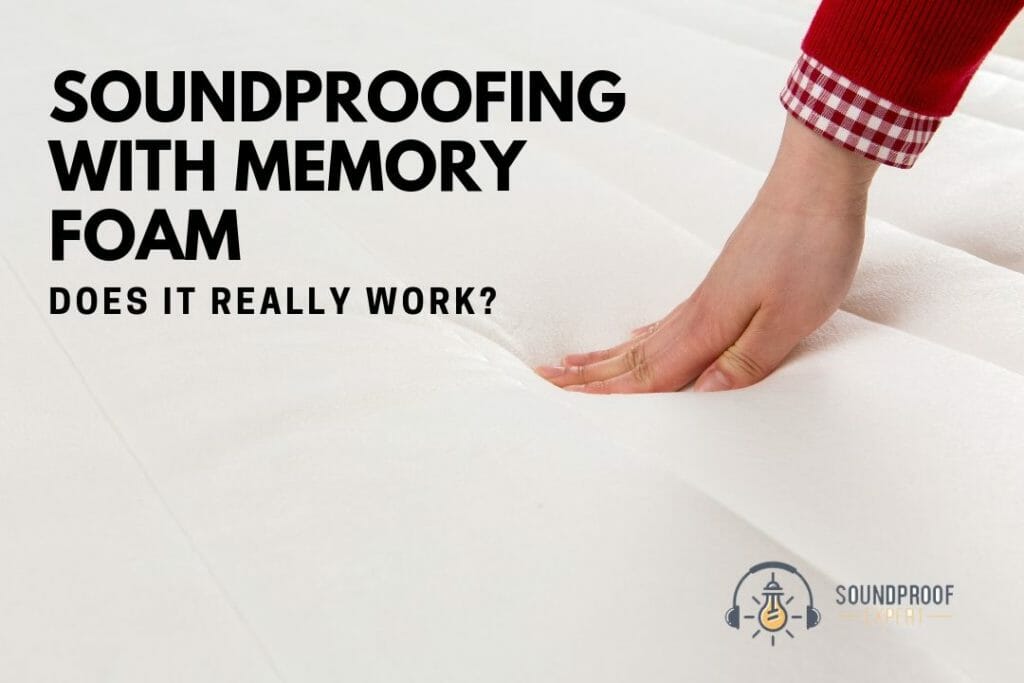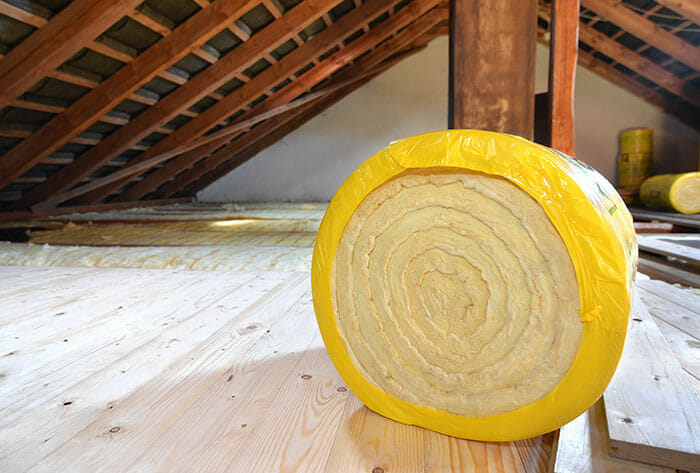
Soundproofing any space can take a lot of effort if you don’t know what materials work best for blocking or absorbing sounds.
If you have a memory foam mattress, you might be curious to find out whether memory foam is good for soundproofing. Who knows, maybe you have an extra memory foam mattress you can use?
So, is memory foam good for soundproofing?
Memory foam is not a good soundproofing material. However, it is an effective material for dampening sound by absorbing sound waves as opposed to reflecting them, which reduces echoes and the distances sound may travel in a given space.
Using the materials you already have can be a huge money and time saver since you might want to simply reuse an existing memory foam mattress or a similar product.
Now, soundproofing might be a challenge if you wish to isolate a particular space by just using memory foam, it can help you out a lot if you’re looking to treat the sound in a particular space of yours.
Does Foam Absorb Sound?
Certain materials are better at reflecting and absorbing sound waves than others, which is why it’s an important consideration to account for when soundproofing a room or anywhere else.
The materials that are most effective at absorbing sound are those that are likely to be found in recording studios.
Foam is an effective material for absorbing sound due to the physical qualities and the construction of the material.
Depending on the type of foam used, it may be more porous and strangely shaped than another kind of foam.
These are important qualities because they ultimately decide how effective they’ll be when soundproofing a space.
Materials that are highly porous, including foam and fabric, are good at absorbing sound waves.
However, it’s important to distinguish the different types of foam that absorb sound, which include open-celled foam and closed-celled foam.
Open-celled foam is what you’d expect in terms of physical characteristics of most foam since it’s very airy and is highly porous. Due to these physical qualities, sound waves are more likely to travel through them and be absorbed (or not be reflected). Open-celled foam is really good at absorbing all types of sounds as well as liquids.

When it comes to closed-celled foam, you have a totally different style of foam. While it’s still foam that’s highly porous, it’s far less airy when compared to open-celled foam.
This reduction of airiness is caused by the material being woven much more tightly to the point that it mostly absorbs specific sound frequencies, especially sounds in the lower frequencies.
Sound waves travel through the air as vibrations of energy which interacts with all kinds of objects.
Depending on the type of object these sound waves interacts with, these waves may be reflected or absorbed. Since these sound waves are a form of energy, foam that’s able to properly absorb them are thus absorbing energy.
Soundproofing foam works by absorbing sound wave energy, but it may not be 100% clear of what’s going on. In my experience, it’s better to have a fundamental understanding of these aspects to have a better idea of what products to invest in.
When sound is produced through some energy source, whether it’s our mouths or a speaker, vibrations are being made through the air that are what we know as sound waves.
Just like the ripple effect you see when dropping a stone into the water, sound travels a similar way through the air. That’s why in space “no one can hear you scream” since there’s no air out there.
Those sound waves travel outside the source as ripples through the air finally to interact with other objects that either reflects, absorbs, or a combination of both. A lot of reflection occurs when you’re in a cathedral made out of stone since stone isn’t able to absorb sound very well. However, foam and other porous materials aren’t able to reflect sound very well and instead absorb it.
When sound waves interact with materials that can effectively absorb sound, like foam, those waves get “trapped” inside the foam and can’t get out. Since the foam is mostly stopping this sound from coming out or being reflected, it has to slow it down with its material. This stopping of the sound waves produces resistance to the movement of the waves and thus generates some heat.
This process of sound absorption is exactly what you experience when you’re in a room full of sound-absorbing materials. By reducing the reflection of the sound wave, you’re essentially stopping the movement of sound which can create a quiet space that’s also well insulated from the outside world.
Popular Acoustic Foam for Absorbing Sound
There are a lot of fantastic products out there that are effective at soundproofing all types of spaces, including rooms, recording studios, and more.
However, it’s not always clear what you can trust or depend on when making such an important purchase, which is why I want to suggest to you a few products you may like.
Mybecca Acoustic Panels Studio Foam Wedges (12-Pack)

One of the best ways to reduce noise in a space is to use acoustic foam, which is why suggest you take a look at the Mybecca Acoustic Panels Studio Foam Wedges (link to read reviews on Amazon). There are few products out there that are of the quality and reputation as these foam panels.
Mybecca is a fantastic brand that has a reputation for producing high-quality soundproofing materials for all types of spaces.
Whether you have a home office, home theater, or recording studio, you’ll have exactly what you need to treat the sound in your space. These panels come in all sorts of different styles and they’re made 100% in the USA.
Burdurry Acoustic Panels Studio Foam Wedges (24-Pack)
Another great brand of acoustic panels that are fantastic at treating sound in spaces is Burdurry, which makes amazing Acoustic Panels Studio Foam Wedges (link to read reviews on Amazon). They come in a larger pack of panels and come at a price that’s incredibly affordable.
Some of the best aspects of these acoustic foam panels by Burdurry is that they’re very good at absorbing sound and they construct them entirely out of eco-friendly foam.
They’re also known to be very good at dampening mid- to low-frequency sounds much better than their competitors, so they should be on the top of your list if this is what you’re looking for.
The Best Materials for Absorbing Sound
You may be wondering what other materials are out there that are effective at absorbing sound.
While foam is one of the best materials you can get, there’s a number of others that are similar in quality and have different benefits when compared to foam.
Acoustic Foam
We’ve been talking a lot about foam already, but the reason’s due to the material being such a great sound absorber.
Acoustic foam is made precisely to be extremely lightweight and consistent while also being highly customizable.
Whenever you go to a recording studio or look around in a home theater, it’s acoustic foam that’ll be the most common material you’ll see.
Acoustic Mineral Wool
Another great material that’s quite popular is acoustic mineral wool. Acoustic mineral wool is great at absorbing sound waves due to its porous characteristics.

Not only that, but it’s very flexible and easy to install in practically any space around you. It’s most commonly found when insulating walls, which is great for anyone serious about soundproofing a room.
I suggest you check out Rockwool Acoustic Mineral Wool Insulation (link to read reviews on Amazon) since they’re the go-to product for acoustic mineral wool soundproofing needs.
Echo Absorber Acoustic Cotton
If you’re looking to find a more eco-friendly solution for your soundproofing needs, echo absorber acoustic cotton is a great option. Not only is it very good at absorbing sounds across a number of frequencies, but it’s also very malleable and easy to install.
It’s also generally mostly made out of recycled materials, which is great for the environment.
The Guteauto Sound Deadening Mat Soundproof Cotton (link to read reviews on Amazon) is exactly what anyone interested in echo absorber acoustic cotton would want.
Quiet Board Water-Resistant Panels
It may be a requirement that your soundproofing material needs to be water-resistant due to the environment you’re in.
Well, quiet board water-resistant panels are made exactly for that use-case since they’re made out of styrofoam that’s highly durable and water-resistant.
While not the best sound-absorbing material of the bunch, it’s still a great option for those who find themselves in a wet or overly humid environment.
Final Thoughts on Memory foam
Whether you’re looking to absorb sounds in a space that’s small, medium, or large, using memory foam may not be the most effective way to go.
By considering the use of more effective foam materials, such as acoustic foam, you’ll have a better chance of dampening sound waves. The great part is that there are a number of different options out there to choose from, so enjoy your journey of finding the right soundproofing foam for you.

Are you a sound engineer I am in an old building in New York City and I want to put it on my ceiling. Whatever the material is so the people upstairs do not affect me.
Do you know the acoustical properties of memory foam carpet padding?